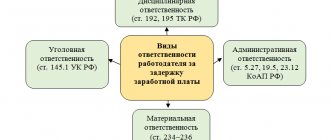ST 145.1 of the Criminal Code of the Russian Federation.
1. Partial non-payment of wages, pensions, scholarships, allowances and other payments established by law for more than three months, committed out of mercenary or other personal interest by the head of an organization, an employer - an individual, the head of a branch, representative office or other separate structural unit of an organization -
shall be punishable by a fine in the amount of up to one hundred twenty thousand rubles, or in the amount of the wages or other income of the convicted person for a period of up to one year, or by deprivation of the right to hold certain positions or engage in certain activities for a term of up to one year, or by forced labor for a term of up to two years, or imprisonment for up to one year.
2. Complete non-payment of wages, pensions, scholarships, allowances and other payments established by law for more than two months, or payment of wages for more than two months in an amount below the minimum wage established by federal law, committed out of selfish or other personal interest by the head of the organization, the employer - an individual, head of a branch, representative office or other separate structural unit of an organization, -
shall be punishable by a fine in the amount of one hundred thousand to five hundred thousand rubles, or in the amount of the wages or other income of the convicted person for a period of up to three years, or by forced labor for a period of up to three years, with deprivation of the right to hold certain positions or engage in certain activities for a period of up to three years, or without it, or imprisonment for a term of up to three years with deprivation of the right to hold certain positions or engage in certain activities for a term of up to three years, or without it.
3. Acts provided for in parts one or two of this article, if they entailed grave consequences, -
shall be punishable by a fine in the amount of two hundred thousand to five hundred thousand rubles, or in the amount of the wages or other income of the convicted person for a period of one to three years, or by imprisonment for a term of two to five years with deprivation of the right to hold certain positions or engage in certain activities for a term up to five years or without it.
Notes . 1. In this article, partial non-payment of wages, pensions, scholarships, benefits and other payments established by law means payment in the amount of less than half of the amount payable.
2. A person who has committed a crime for the first time, provided for in parts one or two of this article, is released from criminal liability if, within two months from the date of initiation of the criminal case, he has fully repaid the debt in payment of wages, pensions, scholarships, allowances and other provisions established by law. payment, and also paid interest (paid monetary compensation) in the manner determined by the legislation of the Russian Federation, and if his actions do not contain another crime.
Commentary to Art. 145.1 Criminal Code
1. The objective side is characterized by inaction - illegal non-payment of wages, pensions, scholarships, benefits and other payments established by law. “Other statutory payments” should be understood as those amounts the payment of which is provided for by law; There is no criminal liability for non-payment of amounts provided for by-laws or local legal acts.
The qualification of criminal acts under Part 1 or 2 depends on the amount of unpaid amounts.
In this case, the real possibility of the person to perform the appropriate actions must be established.
2. The crime is considered completed after three consecutive months, starting from the day established by law or local regulations for making the appropriate payments.
3. Special subject: the head of a legal entity of a branch, representative office or other separate structural unit of an organization or an employer - an individual.
4. Grave consequences (Part 2) are an evaluative concept (for example, termination of education for loved ones due to the inability to continue paying for education).
What to do if the company does not pay money
If there is a delay in wages at the enterprise, and the administration does not give precise answers to the question of when payments will be made, then you should go to the prosecutor’s office.
Workers should also receive compensation for failure to make timely payments. This issue is regulated by Article 236 of the Labor Code.
It would be much more effective to contact the supervisory authority as a whole team, or at least as a group. If the prosecutor's audit confirms the existence of a delay, the employer will be punished in one of the above ways.
If we are talking about criminal liability (for non-payment of wages), then the information received by the prosecutor will be transferred to the Investigative Committee, which in turn will conduct an additional investigation and send the case to court. As a rule, the punished employer is under the control of the prosecutor's office for a certain time.
To be fair, it must be said that these days, salary delays are a fairly rare occurrence; they are not widespread. Such cases usually arise in small enterprises or in companies at the stage of bankruptcy
It is important for the employee to know that the latter is also not a valid reason justifying non-payment of wages.
Second commentary to Art. 145.1 of the Criminal Code of the Russian Federation
1. The object of the crime is the constitutional right to remuneration for work (Article 37 of the Constitution of the Russian Federation). The victim is an employee, employee, student, pensioner, etc.
2. The objective side of the crime provided for in Part 1 of Art. 145.1, is characterized by actions (inaction) - partial non-payment of wages, pensions, scholarships, benefits and other payments established by law for more than three months. Under it, in accordance with Note 1 to Art. 145.1 of the Criminal Code means making a payment in the amount of less than half of the amount payable. The crime is completed after the expiration of the specified period.
3. Part 2 of the article under consideration establishes increased liability for complete non-payment of wages, pensions, scholarships, benefits and other social payments for more than two months or payment of wages for more than two months in an amount below the established minimum wage.
4. The subject of the crime is a special one: the head of an organization, regardless of the form of ownership, the employer is an individual, the head of a branch, representative office or other separate division of the organization.
A person who has committed a crime for the first time, provided for in parts one or two of this article, is released from criminal liability if, within two months from the date of initiation of the criminal case, he has fully repaid the debt in payment of wages, pensions, scholarships, allowances and other payments established by law, and also paid interest (paid monetary compensation) in the manner determined by the legislation of the Russian Federation, and if his actions do not contain another crime (Note 2 to this article of the Criminal Code).
5. The subjective side is characterized by direct intent. The person is aware that he is committing non-payment of wages, pensions, scholarships, benefits and other payments established by law, and wishes to do so. A mandatory feature of the subjective side of this crime is the motive - selfish or other personal interest.
6. Part 3 of this article of the Criminal Code of the Russian Federation provides for a qualified type of this crime - causing grave consequences. They should be understood as: death or serious injury to health, for example, as a result of lack of funds to pay for the treatment of an employee or his relatives, loss of housing as a result of failure to fulfill financial obligations to creditors and other consequences that occurred as a result of non-payment of wages, pensions, scholarships, benefits and other payments.
Definition of partial payments
It should be noted that Article 145.1 implies such acts that entail liability as:
actions related to partial non-payment of funds due to citizens;
actions related to complete non-payment.
If according to the last point it becomes clear that complete non-payment is a complete lack of funds intended for various categories of citizens, as stated in Article 145.1 of the Criminal Code of the Russian Federation, then partial non-payment by the legislator in judicial practice has created many questions.
Article 145.1 itself also defines partial non-payment. The Supreme Court amended the note to it in the form of an addition to determine this amount of unpaid funds.
It has now been established that types of incomplete payment include actions of a monetary nature that were performed in less than half of the total amount intended for citizens.
Third commentary to Article 145.1 of the Criminal Code of the Russian Federation
1. The object of the attack under this crime is social relations in the sphere of payment to citizens of remuneration for labor and other mandatory payments. The subject of the crime is wages, pensions, scholarships, benefits and other payments. Wages, part of the national income that goes to the individual consumption of hired workers. Nominal wage is the amount of money received by an employee for performing work during a certain period of time, real wage is the amount of goods and services that can be purchased for it. Depending on the specifics of labor, time-based and piece-rate wage systems are used. Pension is monetary security received by citizens from pension, insurance or other funds upon completion of work, upon reaching a certain age, due to disability and in some other cases. The state guarantees social security for pensioners, including through regular revision of pension amounts as the cost of living changes. The scholarship (fee) involves a cash benefit regularly issued to full-time students (faculties) of various state educational institutions.
2. Part 1 of this article provides for liability for partial non-payment of wages, pensions, scholarships, benefits and other payments established by law for more than three months. The objective side of the crime is expressed in inaction. In this case, the amount of partial non-payment is determined by the legislator in the note to this article and amounts to a payment of less than half of the amount payable. The elements of the crime are formal; it is considered completed if the subject is unlawfully inactive after three months from the date the obligation to make the appropriate payments arose. The subjective side is characterized by guilt in the form of direct intent, as well as selfish goals or other personal motives. The subject of the crime is special: the head of the organization or the employer - an individual, or the head of a branch, representative office or other separate structural unit of the organization. We are talking about both officials and subjects performing management functions in a commercial organization. This circumstance allows us to speak about the need for additional qualification of the actions of the perpetrator, respectively, under Art. Art. 201, 285 or 286 of the Criminal Code. At the same time, in our opinion, additional interpretation is necessary for such a subject as an employer, who cannot always manage the funds of organizations and enterprises. The law also says nothing about such entities as acting. manager, etc.
3. Part 2 of this article provides for liability for an act in the form of alternatively committed actions: complete non-payment of wages, pensions, scholarships, benefits and other payments established by law for more than two months, or payment of wages for more than two months in an amount below the minimum wage established by federal law labor. In accordance with the law, the minimum wage from January 1, 2013 is set at 5,205 rubles per month. The subjective characteristics in this act coincide with the act, responsibility for which is established in Part 1 of this article.
4. Qualified composition (Part 3) provides for liability for the above acts that entailed grave consequences.
Recognizing the consequences as grave is the prerogative of the court, but we may be talking about consequences such as suicide, causing grievous harm to the health of the victim, illness of loved ones, etc. In each specific case, it is important to establish the existence of a causal relationship between the act and the resulting consequences. ‹ Article 145. Unreasonable refusal to hire or unjustified dismissal of a pregnant woman or a woman with children under three years of age Up Article 146. Violation of copyright and related rights ›
When responsibility comes
Before understanding what criminal liability is imposed for non-payment of wages, it is necessary to clarify that the employer has no justification for committing such actions. The lack of money is a personal difficulty for the person or company that hired the employee; the employee’s well-being should not suffer from this in any way.
In our country, non-payment of wages is one of the sore subjects. It manifested itself especially clearly in the 90s. XX century and the first half of the 2000s. XXI century. Now this problem is not so urgent, but many workers periodically face it.
Due to the sensitivity of the topic, this issue is clearly regulated by the legislator; this can be confirmed by a document such as Article 145 1 of the Criminal Code of the Russian Federation with comments. Also, liability for late payment is regulated by the Labor Code of the Russian Federation. There are also references to the above-mentioned normative act: Article 145, part 1 (partial delay for 3 months) and Article 145, part 1 2 of the Criminal Code of the Russian Federation (no payments for 2 months), as well as the Code of Administrative Offences.
Liability in accordance with the provisions of the Criminal Code is possible in the presence of the following violations:
- The employer has the opportunity to pay employees, but uses funds for other needs, for example, the purchase of goods or equipment. In this situation, the importance of the actions performed in return for the payment of wages does not matter. If an employer has money and a debt to the employees of the organization, he is obliged to repay it to the detriment of any other interests, including he must delay the payment of the loan, if any, but pay wages.
- The employer does not pay the employee wages even partially for two months (second paragraph of Article 145, 1 of the Criminal Code of the Russian Federation). If any payments are not made within 2 months, then the administration of the enterprise, and possibly its owners, face liability under the Criminal Code of the Russian Federation.
- The employer paid less than half of what the employee earned over the last 3 months. Such non-payment is called partial, and it is also subject to liability in accordance with the first part of Article 145.1 of the Criminal Code.
Failure to pay wages for more than 2 months is considered a crime in the Criminal Code of the Russian Federation, this also applies to partial delay. At the same time, from the point of view of the management company, it does not matter whether the enterprise has money or not. If not, then the administration must solve this problem in any way, including selling part of the company, equipment, etc.
When faced with non-payment of wages at an enterprise, an employee should study not only the Criminal Code. First you need to read labor legislation. In particular, Article 142 of the Labor Code states that wages must be paid at least 2 times a month on the days specified in the employment contract. If the pay day falls on a weekend, the salary must be paid earlier. Other options are not provided for by law.
It is important to know that if the employer has delayed payment for more than 16 days, the employee may not go to work by notifying the company management in writing. At the same time, his salary must be accrued for all such weekends.
Responsible persons
Article 145.1 alone will not be singled out as a separate paragraph or part of all responsible entities who are punished for actions committed for selfish reasons related to the seizure of funds due to citizens.
Article 145.1 appoints the following responsible entities for this type of crime:
heads of organizations - directors and owners of companies who decided, for personal mercenary reasons, to illegally cut or even appropriate the salaries of their employees;
employers located in structural divisions;
individual entrepreneurs with the status of an individual;
representatives of structural departments in the general composition of the company.
Each of such persons bears personal responsibility. As a result, they may receive a real sentence, a monetary fine, or a complete disqualification by a court order for a specified period of time.



